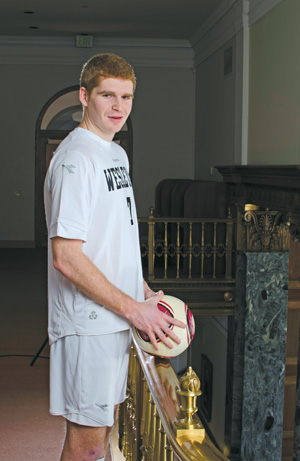Commencement 2011
When you are discouraged, stop and think about Rwanda’s recovery . . . or some other evidence of the value of persistence and knowledge and solidarity and connection; think about the friendships you’ve made here and draw on them,” Dr. Paul Farmer told the Wesleyan Class of 2011, their families, faculty, and guests at the 179th Commencement Ceremonies on Wesleyan’s Andrus Field on Sunday, May 22, 2011. “I know the world can be a troubled place, but I look out over this crowd and know that the future is in good hands.”
Farmer, a physician-anthropologist and author, founded Partners in Health, an international nonprofit organization that provides direct health care services to the sick living in poverty. Farmer is also the Kolokotrones University Professor and Chair of the Department of Global Health and Social Medicine at Harvard Medical School; Chief of the Division of Global Health Equity at Brigham and Women’s Hospital; and was the United Nations Deputy Special Envoy for Haiti under former U.S. President Bill Clinton.
Farmer was one of five people who received honorary doctorates: Broadway singer Barbara Nell Cook; Alberto Ibargüen ’66 P’97, CEO of the John S. and James L. Knight Foundation; and community service leaders and friends of the university Jean Adams Shaw P’79 and Ralph “Biff” H. Shaw II ’51, P’79.
Robert Patricelli ’61 P’88 P’90 and Margaret Sweetland Patricelli were awarded the Raymond E. Baldwin Medal. Named for the late Judge Raymond E. Baldwin ’16, the medal is the highest honor Wesleyan’s alumni body presents for extraordinary service to Wesleyan or for careers and other activities which have contributed significantly to the public good.
Also on Denison Terrace, 719 students received Bachelor of Arts degrees; 45 were awarded a Master of Arts in Liberal Studies; 35 were granted a Master of Arts; and 14 received Doctor of Philosophy degrees.
In his address to the Class of 2011, President Michael S. Roth ’78 saluted the graduates and the honorary degree recipients, and spoke of the advantages of a Wesleyan education and a liberal arts degree.
“At Wesleyan we understand the sciences to be a vital part of the liberal arts and not just pre-professional training. The key to our success in the future will be an integrative education that doesn’t isolate the sciences from other parts of the curriculum, and that doesn’t shield the so-called creative and interpretive fields from a vigorous understanding of the problems addressed by scientists. Interdisciplinary science programs are among our fastest growing majors, and initiatives linking the sciences, arts, and humanities have been areas of intense creative work. Students and professors aren’t crossing departmental boundaries in order to be fashionably interdisciplinary. They join forces to address specific problems or in pursuit of particular opportunities.”
Roth also said that those calling for an increased focus on math or science at the expense of the liberal arts, all in the name of national competitiveness, are ultimately making a grave error.
“Around the country, the retreat from liberal learning in the name of a more efficient, practical college education is likely to lead to the opposite: men and women who are trained for yesterday’s problems and yesterday’s jobs, men and women who have not reflected on their own lives in ways that allow them to tap into their capacities for innovation and for making meaning out of their experience. Under the guise of ‘practicality’ we are really hearing calls for conformity, calls for conventional thinking that will impoverish our economic, cultural and personal lives.”
For more information and photos, please see http://newsletter.blogs.wesleyan and search for 179th Commencement. UPFRONT

